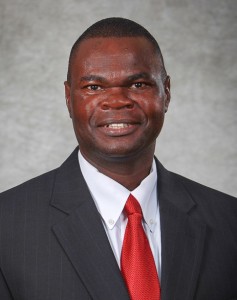
Faculty Write Commentaries for WorkingPreacher.org
Saint Paul faculty members Dr. Amy Oden, Professor of Early Church History and Spirituality, and Dr. Israel Kamudzandu, Associate Professor of New Testament Studies and Biblical Interpretation, have contributed numerous commentaries to the popular website for preachers, WorkingPreacher.org.
Dr. Amy Oden
 Dr. Amy Oden is a faculty member at the Saint Paul: Oklahoma City University campus location of Saint Paul School of Theology. She teaches using video teleconferencing with students on both campuses. Her areas of special interest and publication include early Christianity, hospitality and women’s contributions to church history. Her most recent book is God’s Welcome: Hospitality for a Gospel-Hungry World (Pilgrim Press, 2008).
Dr. Amy Oden is a faculty member at the Saint Paul: Oklahoma City University campus location of Saint Paul School of Theology. She teaches using video teleconferencing with students on both campuses. Her areas of special interest and publication include early Christianity, hospitality and women’s contributions to church history. Her most recent book is God’s Welcome: Hospitality for a Gospel-Hungry World (Pilgrim Press, 2008).
Here’s an excerpt from Dr. Oden’s commentary on Esther 4:1-17
Esther is an unlikely heroine. As a mirror image of the Hebrew people in exile, Esther is herself an orphan, without the security, identity, and rootedness of family. She appears to be rescued when she is taken in by her cousin, Mordecai, who becomes her foster parent. But even this respite is short-lived when she is tapped for the king’s harem, and taken from the safety of his home in Susa, and thrust into the intrigue — both political and sexual — of the Persian royal court.
Read Dr. Amy Oden’s full commentary at WorkingPreacher.org
Dr. Israel Kamudzandu
 Dr. Israel Kamudzandu is a faculty member at the Saint Paul: Church of the Resurrection campus location. He teaches students and laity in both locations as well. He is the author of Abraham Our Father: Paul and Ancestors in Postcolonial Africa (Fortress Press, 2013), and Abraham as a Spiritual Ancestor: A Postcolonial Zimbabwean Reading of Romans 4 (Leiden: Brill, 2010), as well as numerous articles.
Dr. Israel Kamudzandu is a faculty member at the Saint Paul: Church of the Resurrection campus location. He teaches students and laity in both locations as well. He is the author of Abraham Our Father: Paul and Ancestors in Postcolonial Africa (Fortress Press, 2013), and Abraham as a Spiritual Ancestor: A Postcolonial Zimbabwean Reading of Romans 4 (Leiden: Brill, 2010), as well as numerous articles.
Here’s an excerpt from Dr. Kamudzandu’s commentary on Hebrews 9:11-14
All these theological themes are captured in one phrase, Jesus, “the eternal Heavenly Priest, according to the order of Melchizedek,” (Hebrews 7:1-9:28). Although the Western church has read, interpreted, preached, and taught this canonical book, I doubt whether they grasp the theological meaning and implications of the symbolism of Jesus’ blood. Yet, Christian practitioners from the Global South or Third World countries are quick to make theological connections with Hebrews’ symbolism because blood rituals are a common feature within their cultural worldview.
Read Dr. Israel Kamudzandu’s full commentary at WorkingPreacher.org
